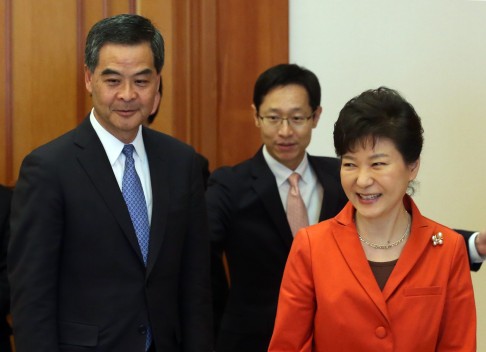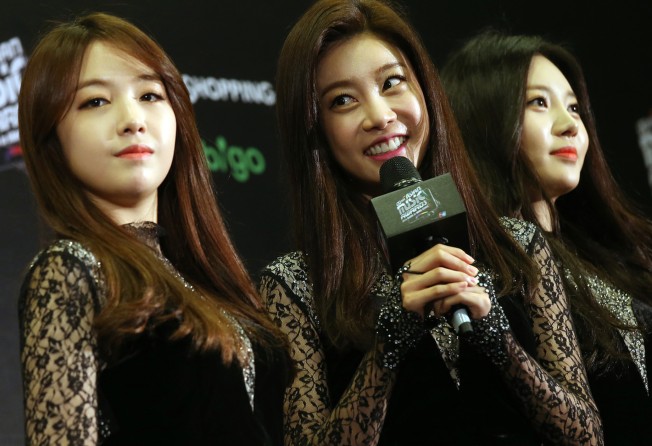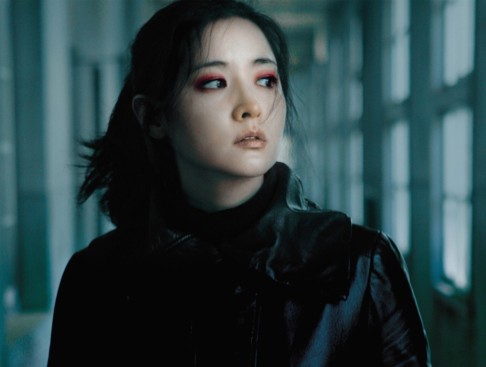
Korean cultural export success rooted in freedom and democracy, industry insiders say
Compared to other Asian countries, where varying degrees of censorship are applied, South Korea has managed to diversify creative content to appeal to a global population

Deafening screams from some 10,000 fans brought down the curtain last week on Hong Kong’s largest, sold-out K-pop award show for the third year in a row.
The mania reaffirmed the success of Korean cultural and creative industries that, industry heavyweights say, owe their accomplishments to the freedom guarded by a democratic society that is seeking to cultivate a creative economy.
South Korean President Park Geun-hye placed those industries on high priority, encouraging new ideas that could contribute to the rise of the country’s creative economy, Mike Suh Hyun-dong, head and senior vice-president of global business at the Seoul-based K-pop exporter CJ E&M, said.
There was little censorship, the greatest enemy to creative freedom.
“Every creative talent, from independent films to music, can choose to create anything around any subject,” said Suh, whose company was the organiser of the star-studded Mnet Asian Music Awards held at the airport’s AsiaWorld-Expo last Wednesday.
Compared to other Asian countries, such as China, Singapore and Malaysia, where varying degrees of censorship are applied, South Korea has managed to diversify creative content to appeal to a global population.
And Hong Kong is a prime importer of K-pop. Chief Executive Leung Chun-ying told Park in Seoul last month that he wanted to invite more Korean stars to the city as a remedy to youth woes.

Recently, Korean actress Lee Young-ae had told the Hong Kong media that freedom and democracy laid the foundation for the success of Korean cultural and creative industries.
Lee’s Jewel in the Palace swept the Korean wave to its first peak when the costume television drama was released in 87 countries in the mid-2000s. She is also the star of Joint Security Area, the 2000 thriller produced by CJ E&M that helped put Korean cinema on a global platform.
But the freedom of expression in South Korea used to be suppressed under a dictatorship, she said.
The people battled for democracy for decades and paid a high price, including in the 1980 Gwangju massacre, where the army killed at least 200 student protesters.
Creative power was unleashed only after the country became democratic, marked by its first free direct presidential election in 1987, Lee said.
Suh added: “But once the society opened up after the 1980s social movements, there was this booming of creative talents, who enjoyed the freedom to create and express.”
Mainland China, on the other hand, is tightening creative freedom while hoping to make cultural and creative industries a pillar of its economy.
In October, President Xi Jinping told a group of artists to make works that promoted socialism instead of “vulgar” works to please the market.
That was followed weeks later by a Xinhua report that the State General Administration of Press, Publication, Radio, Film and Television planned to send artists, filmmakers and television crew to rural areas “to form a correct view of art”.
K-pop, meanwhile, continues to power ahead. Its music market went up from US$148.5 million in 2008 to US$195.8 million in 2011 before slipping down 4.3 per cent to US$187.4 million in 2012, figures from the International Federation of the Phonographic Industry showed.

Thanks to the K-pop boom, the market is now ranked the 11th largest in the world.
For mainstream audiences, there are television dramas such as My Love from the Star, while highbrow-film buffs get to indulge in edgy movies of high-quality production and aesthetics at international film festivals.
The result of the cultural exports was an increase in the sales of consumer goods. In 2012, every US$100 of cultural contents exported brought an average rise of US$412 in exports of consumer goods, statistics from the Overseas Economic Research Institute of the Export-Import Bank of Korea showed.
Processed foods led the way, followed by apparel and information-technology products.
“The cultural contents exports change perceptions of Korean products,” Suh said. “The dramas in particular create a lifestyle that is accessible by purchasing the products such as food, clothing and beauty items.”
CJ E&M’s role in all this is in operating television channels and producing films, music and live entertainment. CJ E&M’s holding company, CJ Group, also operates a retail arm, including a shopping television channel and chain stores, to carry products featured in creative content produced by CJ E&M.

“We create an ecosystem,” Suh said.
A transparent profit-sharing system encouraged investment and hard work from creative talent as they knew clearly what they would get in return, he added.
Suh said CJ E&M had plans to venture into the mainland, but was stymied by a lack of software infrastructure such as promotion, marketing and advertising.
Beyond the success of South Korea’s creative industries, Suh hoped to see a further expansion of Asian creative content in the global mainstream.
“Asian content should be able to strike a balance with Western content in a global market,” he said.